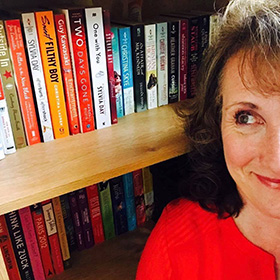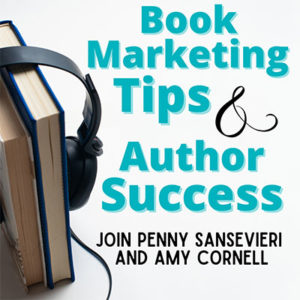In today’s fast-paced world, time is a precious commodity, and social media can be a big stumbling block for a lot of authors.
Many of you are reevaluating the role of social media in your marketing strategies, as the impact often falls short of expectations.
The dream of a post going viral or a TikTok video catapulting book sales overnight is undeniably alluring, but elusive, leaving many of us discouraged and trapped in a seemingly endless cycle.
But the issue goes beyond mere disappointment. Consider the fleeting shelf life of posts on various social platforms:
– Twitter (X): 18 Minutes
– Instagram: 21 Hours
– Facebook: 5 Hours
– LinkedIn: 24 Hours
– TikTok: Instant decay
Understanding the correlation between post visibility and platform engagement is crucial. Moreover, it’s essential to connect with your audience authentically, a challenge that social media often fails to address effectively.
And another correlation worth mentioning, the shorter the shelf life of your posts on social, the more aggressive you need to be about your posts to gain visibility – meaning the more you need to post, in some cases multiple times a day.
To be truly successful on social media you almost have to treat it like a second job. And most authors are already juggling 2 or more of those as it is.
So while social media may seem like something you have to be doing, there are alternative strategies that can yield more significant impacts if you’re willing to put in the work.
And I want to be clear: these tips are for those of you who want to stay off social media completely, and for those who just want to scale back. Maybe you’re ready to have only one social media account, but you also understand you need to make up for that lost exposure potential in other ways.
Check out this piece on maximizing your presence on one focused social media site.
So let’s explore beyond the realms of social platforms, and consider enhancing the following tools:
1. Embrace Video Content
YouTube (now hear me out), is an often-underused platform for authors across genres that offers videos with a shelf life of 30+ days. Ideas include short clips of events, book tutorials, tips and advice, getting-to-know-me Q&As, talking about who you’d cast as characters in the movie version, reviews of other titles in your genre, and the list goes on. Videos don’t have to be long, in fact, short clips can be just as effective. Aim for a combination of short an long, it’s more important that the content be engaging, useful, entertaining, and purposeful versus trying to hit a certain minute mark.
The other reason I love video is that it can be easily repurposed on your blog, in your newsletter and on social media if you’re opting to simply downgrade to one account. YouTube is also a search engine, second only to Google, which is great for your online visibility.
Here’s a piece on other really engaging and successful social media content ideas.
2. Fine-Tune Your Website
Many times our website winds up at the bottom of our to-do list. But it’s a critical part of your platform, so treat your website as your professional resume. Think of your website and your Amazon presence as your virtual storefronts. You wouldn’t let a brick-and-mortar store flounder and remain unkempt, so don’t let it happen online – because your online traffic potential is so much higher!
Ensure your website is a centralized hub for readers to find comprehensive information about you, including news, reviews, upcoming releases, and blog content. It should also be an extension of your promise to your reader. What is that? Well, if you write non-fiction your promise is your solution, your guidance, your expertise. Include additional resources on your site like quizzes, tips, daily inspirational tasks or advice, make your site somewhere people need to come back to. If you write fiction your promise is the world you created, so things like character profiles, maps and locales, insight into your world-building or research process, just give them more.
Redirecting readers to your website provides stability and control over your online presence. Even if you still plan to keep one social media site going, it’s a good idea to funnel readers to your website.
Check out these 10 expert tips for creating a successful author website.
And here’s a rundown of why you need a media page, and how to make the most of it.
3. Strengthen Your Blog
Your blog serves as the gateway for readers to get to know you better. In short, it’s a great way to communicate with your readers. We talked about your promise in the previous tip, your blog is a good place to post all that extra content.
Non-fiction authors can use the blog to showcase your expertise, and as a way to prove you’re staying on top of current topics and news cycles. Your blog then becomes a key piece of your portfolio for when you pitch other platforms and media for guest pieces and interviews—all the endeavors that support becoming a thought leader.
For fiction authors, it offers an ongoing conversation to keep followers updated on your activities. But it also serves as a great tool for creating a multidimensional brand with insider info, deep dives into characters, and other creative elements that can expand on your book’s storyline or the world you’ve created.
And another bonus for having a well-developed blog? You can pitch yourself as a guest contributor using your site as your resume. Here’s a piece we wrote on successfully pitching yourself for guest content opportunities.
4. Develop a Newsletter
A newsletter is a vital tool for authors, providing a direct channel to connect with readers who have already signed on to support your work.
Creating a compelling newsletter also opens opportunities for cross-promotions and collaborations with other thought leaders in your topic or authors in your genre. Most of the time, authors put this off because they aren’t sure what to talk about. Don’t overthink this part. Share some insider stuff, be funny, or helpful, whatever makes sense for your brand and your readers. Keep it short until you find other ways to expand. And don’t forget the humble brags, highlight things like accolades, media coverage, and limited-time discounts with a clear message that you’d like them to forward the newsletter to friends or colleagues as a way to recommend your work. Personal recommendations are the easiest way to get additional sales.
And if you’re wondering how to build your list, that’s two words: reader magnet. Give people who sign up a solid reason for sharing their email address, so a bonus download, a free gift, free swag, or entry into a monthly giveaway, get creative and make it worth it. Think about what would encourage you to sign up…
Check out this podcast episode we did on how to make the most of your author newsletter.
And here’s a piece we did that covers all things newsletters and using one to bolster your platform.
5. Pitch Podcasts
It seems that everyone has a podcast these days, doesn’t it? But there’s a good reason for that. Not only do episodes have longevity – a 174-day shelf life! But podcasts have a tremendous reach, in fact, according to Exploding Topics Research, podcast listeners have increased by 40 million in the last year. By 2025, global listeners are expected to surpass 500 million – around 23.5% of all internet users. So, if you haven’t started pitching yourself to shows, now is a good time. Also, podcasts can make great additions to your media room – and it’s great for sharing on any social media site you choose to keep.
The exposure you may miss out on by not being on social media can easily be made up by getting on the “up next” list for a show’s listener base.
Here’s a guide we created on pitching podcasts the right way, because you often only get one shot.
6. Engage Local Influencers
Local media may feel less glamorous than big national targets, but there’s a lot of value in digging into your local market. And while local media loves their local authors, you should also consider the influencers: your local bookstores, specialty shops, libraries, lifestyle and activity thought leaders with social accounts, and so on.
Bookstores, for example, almost always have a local author table. Stop by and see if you can participate in that. They may also have a seasonal table. So around the holidays you’ll see holiday-themed books or a “shop local” table.
Libraries are also often overlooked, but we’ve had great success getting our authors into their local libraries. Walk in with your book and ask the librarian if they’d consider keeping your book on the shelf. This is also a great time to inquire about library events you may be able to participate in or volunteer for. Also, libraries love large print books – so if this is an option for you it’s another consideration and another way to get into your local library market.
I know an author who spent all her time saturating her local market. Her books or bookmarks were everywhere, and she sold a lot of books just from this local exposure. She told me that in her first month she sold 5,000 books – just to her local market. So there’s value in focusing on local and making a real go of it, but a lot of authors never commit to giving it a real chance.
Here’s a piece we did on networking with local businesses and venues to plan an author event.
Plus here are 8 ways to sell more books locally.
7. Explore Creative Avenues
Listicles, or articles in list format, are another great way for authors to get out there. Consider Buzzfeed, which lives and breathes all sorts of lists and quizzes. And if your list or quiz is good, it’s not hard to get placement on that site.
Gift guides are another great option, and you can find a lot of these in HARO (Help-a-Reporter-Out). And gift guides aren’t just for the holidays, but for year-round shopping and special occasions, so they can stay on your ongoing to-do list.
Subscription boxes are another opportunity that authors don’t consider. But with all your newly found free time not playing the social media game, it’s worth the effort. Submission guidelines are on most sites and your goal is to find the best matches for your reader market. That’s really key. Yes, there are a lot of book-centric subscription boxes now, but what I’m talking about are boxes that aren’t heavily focused on books. Why try to compete with the thousands of other books trying to vie for a spot? Instead, zero in on that children’s subscription box if you publish children’s books, or a women’s lifestyle gift box if you publish something that resonates with a certain vibe or lifestyle philosophy.
Here are some tips for breaking out into trade magazines if you write non-fiction.
Plus some tips for getting into catalogs and subscription boxes.
Getting off of social media, or reducing the amount of social platforms you manage, really frees up your time to focus on other things that can drive more sales.
But the key is channeling that time and energy into something worthwhile. Getting off social media to simply do less is certainly a choice, but it will not help your book.
Deciding to opt out of, or reduce, social media involvement can seem risky, but the potential benefits are worth the effort.
Redirecting your time and energy towards these alternative strategies can yield tangible and sustainable results, providing a refreshing perspective on your book marketing.
Resources and Free Downloads
Download our free monthly book marketing planner.
Download our free Reader Profile Brainstorm.
4 ways to boost your pre-order without spending a dime.
How and why readers buy books.
A helpful list of book awards and contests.
Why your Amazon reviews are getting pulled and what to do about it.
Check out all the episodes of our book promotion podcast anywhere you listen to podcasts!
Be sure to sign up for our newsletter on the right-hand side of our blog homepage. If you haven’t opened a recent one your registration may have lapsed.
Follow us on Instagram for book marketing tips and some much-needed levity!





Great info, Penny Sansevieri i Never thought about to b successful without author but you open my mind thanks. I would to read more blog from you.